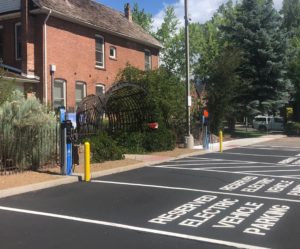Solar and electric vehicle charging programs increase access to clean resources.
Since announcing its clean energy commitment in January 2020, the company reports steady progress in adding more carbon-free resources to meet the growing energy needs of its customers. Last year, APS secured more than 400 megawatts of clean energy capacity, including 200 megawatts of wind power and 75 megawatts of demand response capability from APS Peak Solutions and APS Cool Rewards — two voluntary energy conservation programs that provide business and residential customers ways to manage energy use on hot summer days and help maintain grid reliability.
“This is an exciting time for APS, as our team of resource experts and energy planners works with cross-sector partners to plan our future carbon-free energy mix,” said APS Public Affairs Manager and Flagstaff-area resident Janet Dean. “We’re focused on integrating renewable resources, empowering our customers with energy efficiency programs and, ultimately, making sound decisions on behalf of our customers and the environment.”
Along with gaining more clean power capabilities, APS plans to acquire additional battery storage that can be combined with the company’s solar power plants, making more renewable energy accessible to customers even after sunset. APS also proposed the Coal Communities Transition Plan to facilitate a shift away from coal and support the communities that are home to coal-fired power stations. The utility plans to end all coal-fired energy production by 2031.
APS began its commitment with an energy mix already 50% clean and has interim target goals of increasing its resource mix to 65% clean by 2030, with 45% of that generation coming from renewable energy.
While the utility plans to closely track and adapt to the future of renewable energy and storage technology, APS customer programs are already providing opportunities for local communities to reduce their carbon footprint.
“APS is collaborating closely with communities that share our vision for a clean energy future,” said Dean. “In Flagstaff, we’ve had a long and successful partnership with the city’s leaders and experts in sustainability. Their support for our customer programs has been essential to expanding the access of our carbon-free resources to residents.”
Like APS, the City of Flagstaff is also focused on accelerating progress toward carbon reduction.
“The City of Flagstaff is taking action to reduce climate pollution and build community resilience,” said City of Flagstaff Sustainability Director Nicole Antonopoulos. “While the city focuses on strengthening our neighborhoods, cleaning our energy sources and managing our consumption, we look to our key partners, like APS, to assist us on the path to carbon neutrality.”
Among APS customer programs focused on promoting clean energy, two have already gained momentum in the Flagstaff area.
Adding Vehicle Charging Stations
The APS Take Charge AZ program expands access to electric vehicle (EV) charging stations and helps prepare Arizona for the anticipated growth of electric vehicle adoption. As part of the program, APS covers the cost of installing and maintaining Level 2 EV charging stations at businesses, government agencies, non-profit organizations and multi-family communities.
The City of Flagstaff and Coconino County already have taken advantage of the program, offering EV drivers charging stations at City Hall and the County’s King Street Complex. Additional charging stations are planned for the Downtown Library, Flagstaff Pulliam Airport and the Flagstaff Aquaplex.
For Flagstaff EV drivers looking to take a trip outside of the area, APS is in the planning stages of launching the second phase of Take Charge AZ. This phase will include the installation of DC fast charging stations at retail and tourist locations in the communities of Sedona, Prescott, Payson, Show Low and Globe. Construction is expected to begin later this year.
Building Solar Communities
New solar parking structures have recently been installed at the City of Flagstaff’s Northern Arizona Center for Entrepreneurship and Technology (NACET) facility and at Flagstaff Shelter Services. These projects are part of the APS Solar Communities program, which offered a unique opportunity for limited and moderate-income customers, government agencies and non-profit organizations to access solar energy resources at no cost.
“APS Solar Communities and Take Charge AZ are two examples of collaborative programming that APS offers, which helped Flagstaff formally launch its climate action agenda,” said Antonopoulos. “APS decarbonization success is critical to Flagstaff’s success.”
APS plans to continue local community coordination and develop innovative programs for customers.
“Our community stakeholders will play a significant role in imagining what our 100% clean energy future will look like,” said Dean. “We’re looking forward to further collaborating with our partners as we work towards an energy mix that is environmentally responsible and provides customers reliable and affordable service.” FBN
By Yessica del Rincón, FBN







